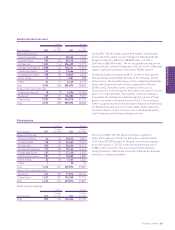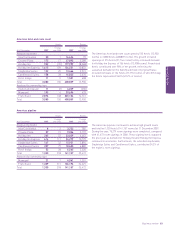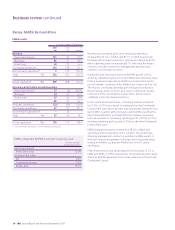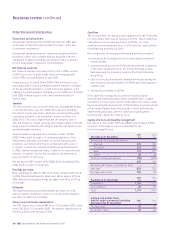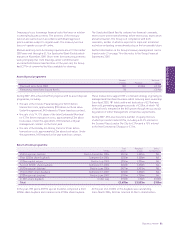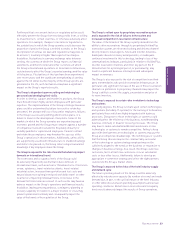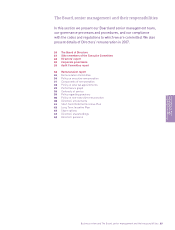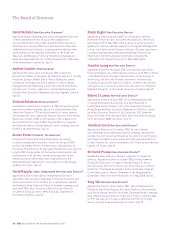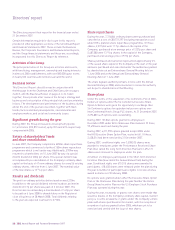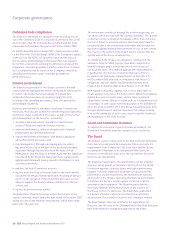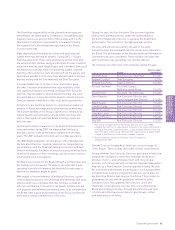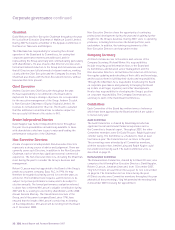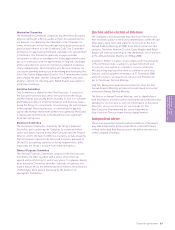Holiday Inn 2007 Annual Report Download - page 25
Download and view the complete annual report
Please find page 25 of the 2007 Holiday Inn annual report below. You can navigate through the pages in the report by either clicking on the pages listed below, or by using the keyword search tool below to find specific information within the annual report.
BUSINESS REVIEW
Business review 23
Further political or economic factors or regulatory action could
effectively prevent the Group from receiving profits from, or selling
its investments in, certain countries, or otherwise adversely affect
operations. For example, changes to tax rates or legislation in
the jurisdictions in which the Group operates could decrease the
proportion of profits the Group is entitled to retain, or the Group’s
interpretation of various tax laws and regulations may prove to
be incorrect, resulting in higher than expected tax charges.
In addition, fluctuations in currency exchange rates between
sterling, the currency in which the Group reports its financial
statements, and the US dollar and other currencies in which
the Group’s international operations or investments do business,
could adversely affect the Group’s reported earnings and the value
of its business. Fluctuations of this type have been experienced
over recent years with the significant strengthening of sterling
against the US dollar. As the majority of the Group’s profits are
generated in the US, such fluctuations may have a significant
impact on the Group’s reported results.
The Group is dependent upon recruiting and retaining key
personnel and developing their skills
In order to develop, support and market its products, the Group
must hire and retain highly skilled employees with particular
expertise. The implementation of the Group’s strategic business
plans could be undermined by failure to recruit or retain key
personnel, the unexpected loss of key senior employees, failures
in the Group’s succession planning and incentive plans, or a
failure to invest in the development of key skills. Some of the
markets in which the Group operates are experiencing rapid
economic growth and the Group must compete against a number
of companies inside and outside the hospitality industry for
suitably qualified or experienced employees. Failure to attract
and retain these employees may threaten the success of the
Group’s operations in these markets. Additionally, unless skills
are supported by a sufficient infrastructure to enable knowledge
and skills to be passed on, the Group risks losing accumulated
knowledge if key employees leave the Group.
The Group is exposed to the risk of events that adversely impact
domestic or international travel
The room rates and occupancy levels of the Group could
be adversely impacted by events that reduce domestic or
international travel, such as actual or threatened acts of terrorism
or war, epidemics, travel-related accidents, travel-related
industrial action, increased transportation and fuel costs and
natural disasters resulting in reduced worldwide travel or other
local factors impacting individual hotels. A decrease in the
demand for hotel rooms as a result of such events may have an
adverse impact on the Group’s operations and financial results.
In addition, inadequate preparedness, contingency planning or
recovery capability in relation to a major incident or crisis may
prevent operational continuity and consequently impact the
value of the brand or the reputation of the Group.
The Group is reliant upon its proprietary reservation system
and is exposed to the risk of failures in the system and
increased competition in reservation infrastructure
The value of the brands of the Group is partly derived from the
ability to drive reservations through its proprietary HolidexPlus
reservation system, an electronic booking and delivery channel
directly linked to travel agents, hotels and internet networks.
Inadequate disaster recovery arrangements, or inadequate
continued investment in this technology, leading to loss of key
communications linkages, particularly in relation to HolidexPlus,
internet reservation channels and other key parts of the IT
infrastructure for a prolonged period, or permanently, may
result in significant business interruption and subsequent
impact on revenues.
The Group is also exposed to the risk of competition from third-
party intermediaries who provide reservation infrastructure. In
particular, any significant increase in the use of these reservation
channels in preference to proprietary channels may impact the
Group’s ability to control the supply, presentation and price of
its room inventory.
The Group is exposed to certain risks in relation to technology
and systems
To varying degrees, the Group is reliant upon certain technologies
and systems (including IT systems) for the running of its business,
particularly those which are highly integrated with business
processes. Disruption to those technologies or systems could
adversely affect the efficiency of the business, notwithstanding
business continuity or disaster recovery processes. The Group
may have to make substantial additional investments in new
technologies or systems to remain competitive. Failing to keep
pace with developments in technologies or systems may put the
Group at a competitive disadvantage. The technologies or systems
that the Group chooses may not be commercially successful
or the technology or system strategy employed may not be
sufficiently aligned to the needs of the business or responsive to
changes in business strategy. As a result, the Group could lose
customers, fail to attract new customers or incur substantial
costs or face other losses. Additionally, failure to develop an
appropriate e-commerce strategy and select the right partners
could erode the Group’s market share.
The Group is exposed to the risks of the hotel industry supply
and demand cycle
The future operating results of the Group could be adversely
affected by industry over-capacity (by number of rooms) and weak
demand due, in part, to the cyclical nature of the hotel industry,
or other differences between planning assumptions and actual
operating conditions. Reductions in room rates and occupancy
levels would adversely impact the results of Group operations.
BUSINESS REVIEW


